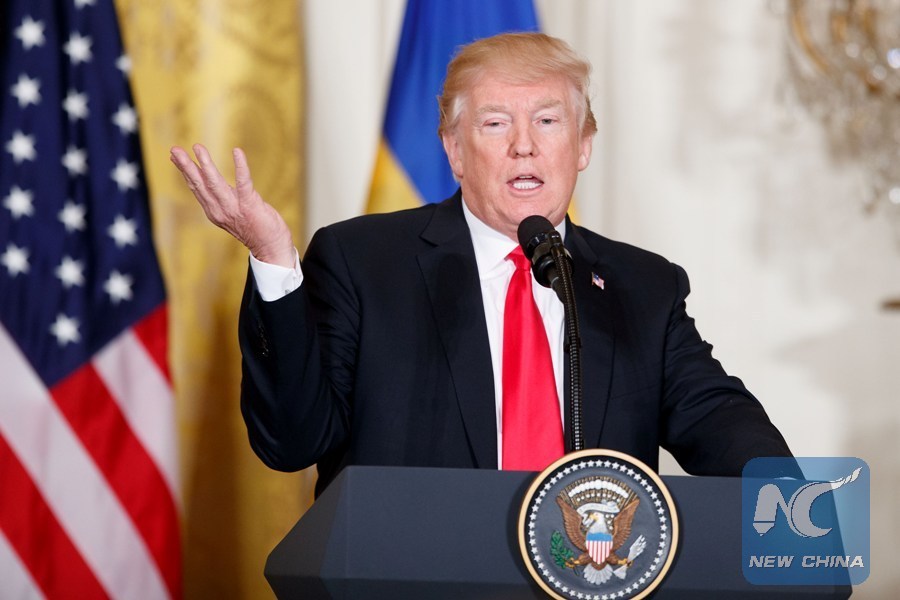
U.S. President Donald Trump addresses a press conference with visiting Swedish Prime Minister Stefan Lofven (not in the photo) at the White House in Washington D.C., the United States, March 6, 2018. (Xinhua/Ting Shen)
WASHINGTON, March 8 (Xinhua) -- U.S. President Donald Trump's newly enacted tariffs on steel and aluminum will likely prompt retaliation by trade partners and legal challenges at the World Trade Organization (WTO), putting the rule-based global trade system at risk, trade experts have said.
POTENTIAL BACKLASH
Despite mounting dissensions amid trading partners around the world, Trump on Thursday formally signed proclamations to impose a 25-percent tariff on imported steel and a 10-percent tariff on aluminum, vowing to protect the U.S. steel and aluminum industry in the name of national security.
The tariffs will take effect in 15 days with initial exemptions for Canada and Mexico, pending the renegotiation of the North American Free Trade Agreement (NAFTA).
"We're going to hold off the tariff on those two countries, to see whether or not we're able to make the deal on NAFTA," Trump said.
While Trump argued that new tariffs would boost American steel and aluminum production, a centerpiece of Trump's 2016 campaign promise, trade experts and economists warned that such tariffs could backfire and ultimately hurt the U.S. economy.
Past experience has shown that such tariffs will likely raise costs for American consumers, hurt American downstream industries that use metals, and cost thousands of jobs in other manufacturing and services sectors.
"I hope that someone in the White House has read the history book," European Union (EU) Commissioner for Trade Cecilia Malmstrom said on Wednesday, referring to the negative consequences from a 2002 decision by the U.S. administration to impose safeguard tariffs on steel imports.
That decision caused about 200,000 American job losses and was successfully challenged by a number of countries at the WTO, according to Clark Packard, trade policy counsel at the Washington-based think tank R Street Institute.
A recent study by the Trade Partnership, a Washington D.C.-based consulting firm, estimated that Trump's new tariffs on steel and aluminum would result in a net loss of 146,000 U.S. jobs after accounting for positive impacts on U.S. steel and aluminum producers.
"I disagree with this action and fear its unintended consequences," House Speaker Paul Ryan said in a statement shortly after Trump's announcement of the tariffs, urging the administration to narrow its policy.
Senate Finance Committee Chairman Orrin Hatch expressed similar concerns about the proposed tariffs, saying "this is a tax hike on American manufacturers, workers and consumers."
"Slapping aluminum and steel imports with tariffs of this magnitude is misguided. It undermines the benefits that the new tax law provides and runs counter to our goal of advancing pro-growth trade policies that will keep America competitive in the 21st century global economy," Hatch said in a statement.
RISE OF TRADE TENSIONS
Major Asian countries on Friday reacted sharply to the U.S. decision on steel and aluminum tariffs, raising the prospect of escalating trade tensions between the United States and its trading partners.
China said it firmly opposed such tariffs and the U.S. move would seriously undermine the international trade order. South Korea said it may file a complaint with the WTO, while Japan said the U.S. measures could "make a significant impact" on the economic and cooperative relationship between the two countries.
Malmstrom said Thursday night that the EU should be excluded from these tariffs and she would seek clarification from the United States on the issue "in the days to come."
The EU has prepared a list of U.S. products, including agricultural products and consumer goods, to "rebalance" any economic damages the bloc suffers if the United States does not exclude it from the proposed tariffs, said Malmstrom.
"I think it's important to wait and see how this develops. If the tariffs are instituted, then countries are likely to retaliate and appeal to the WTO," Howard Shatz, a senior economist at the RAND Corporation, told Xinhua.
U.S. officials and farmers have expressed concerns about potential retaliation against American agricultural exports.
In an open letter to Trump on Wednesday, all six congressional lawmakers from the U.S. agricultural state of Iowa warned that the tariffs on imported steel and aluminum "could set into motion a chain of retaliatory measures, hurting Iowans from the family farm to the family-owned manufacturing plant."
"As farmers have already faced several years of low commodity prices, any hit to demand would be devastating to their financial situations," the letter said.
UNDERMINING GLOBAL TRADING SYSTEM
While U.S. trade partners can challenge the U.S. action at the WTO, the settlement, whether it favors America's trade partners or not, could push the WTO into a lose-lose situation, undermining the global trade system, said Chad Bown, a senior fellow and trade expert at the Peterson Institute for International Economics.
If the United States loses the case, it might react by ignoring the legal ruling, undermining the WTO, or withdrawing from the WTO, he said.
If the country wins the case, it will open the door for all countries to invoke the national security exception to justify broad-based import restrictions, Bown added.
"When we lose that moral high ground, we started opening up that Pandora's box, or when we provide the WTO as the adjudicator of what's in our national security, it's a very dangerous situation," said Michael Froman, former U.S. trade representative in the (Barack) Obama administration, warning that's a way of "bringing the WTO to a moment of crisis."
Wang Hejun, a senior official at China's Ministry of Commerce, also said abuse of the clauses on the national security exception by the United States would damage the WTO, urging Washington to respect the multilateral trade system and revoke the policy as soon as possible.
"The root cause of the problem in the steel and aluminum sector is global overcapacity ... this can only be addressed by cooperation, getting to the source of the problem and working together," said Malmstrom.
"What is clear is that turning inward is not the answer. Protectionism cannot be the answer, it never is," she added.















